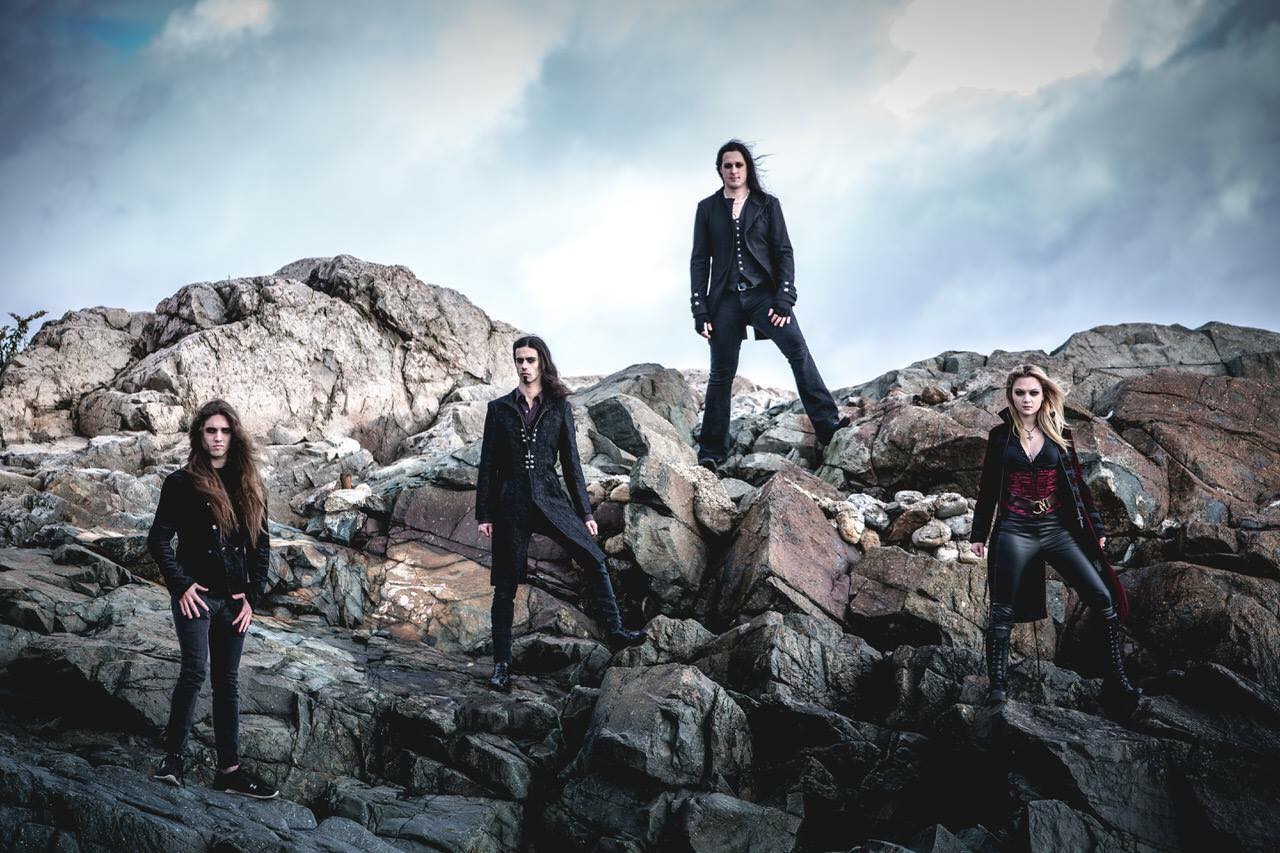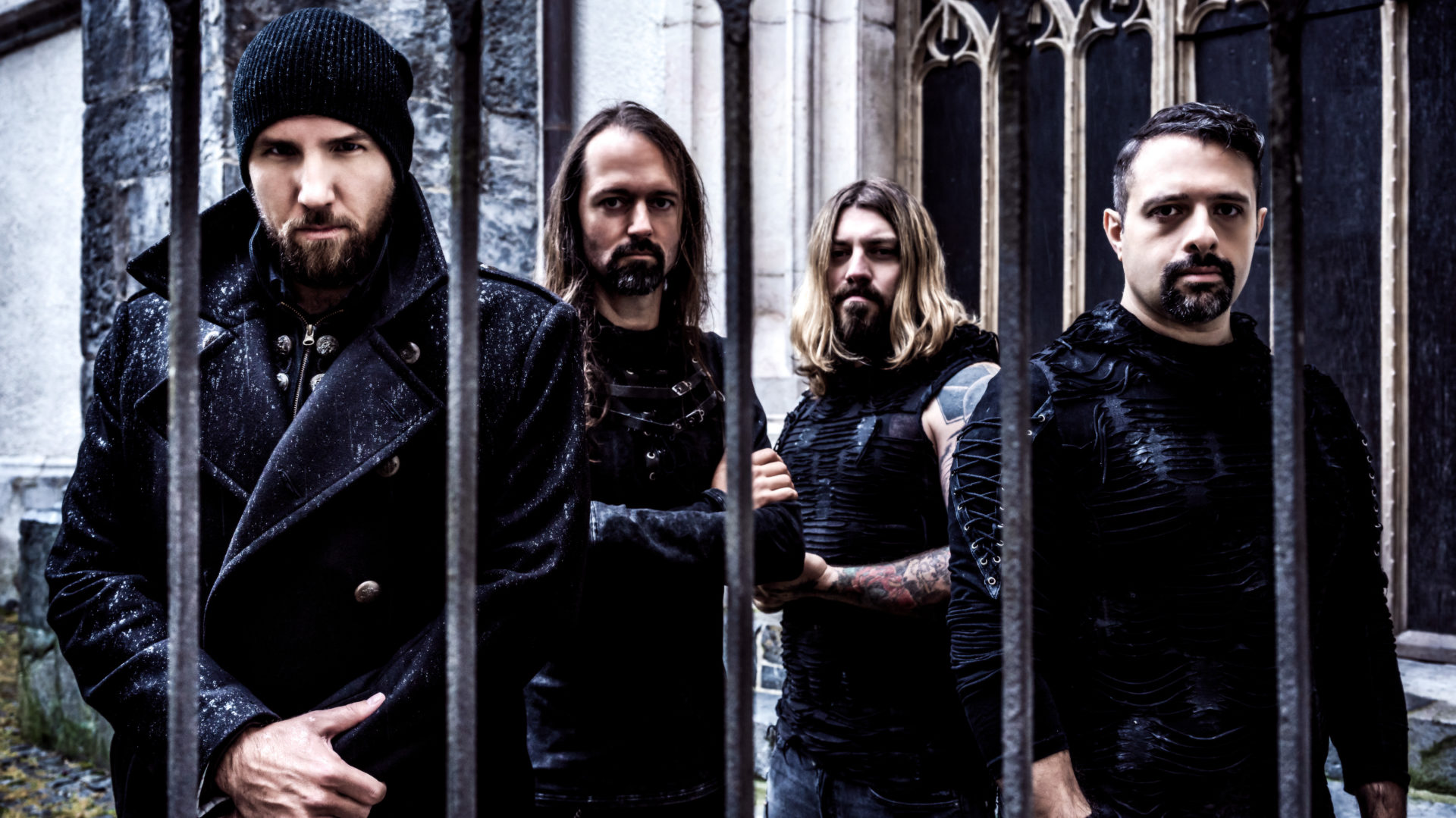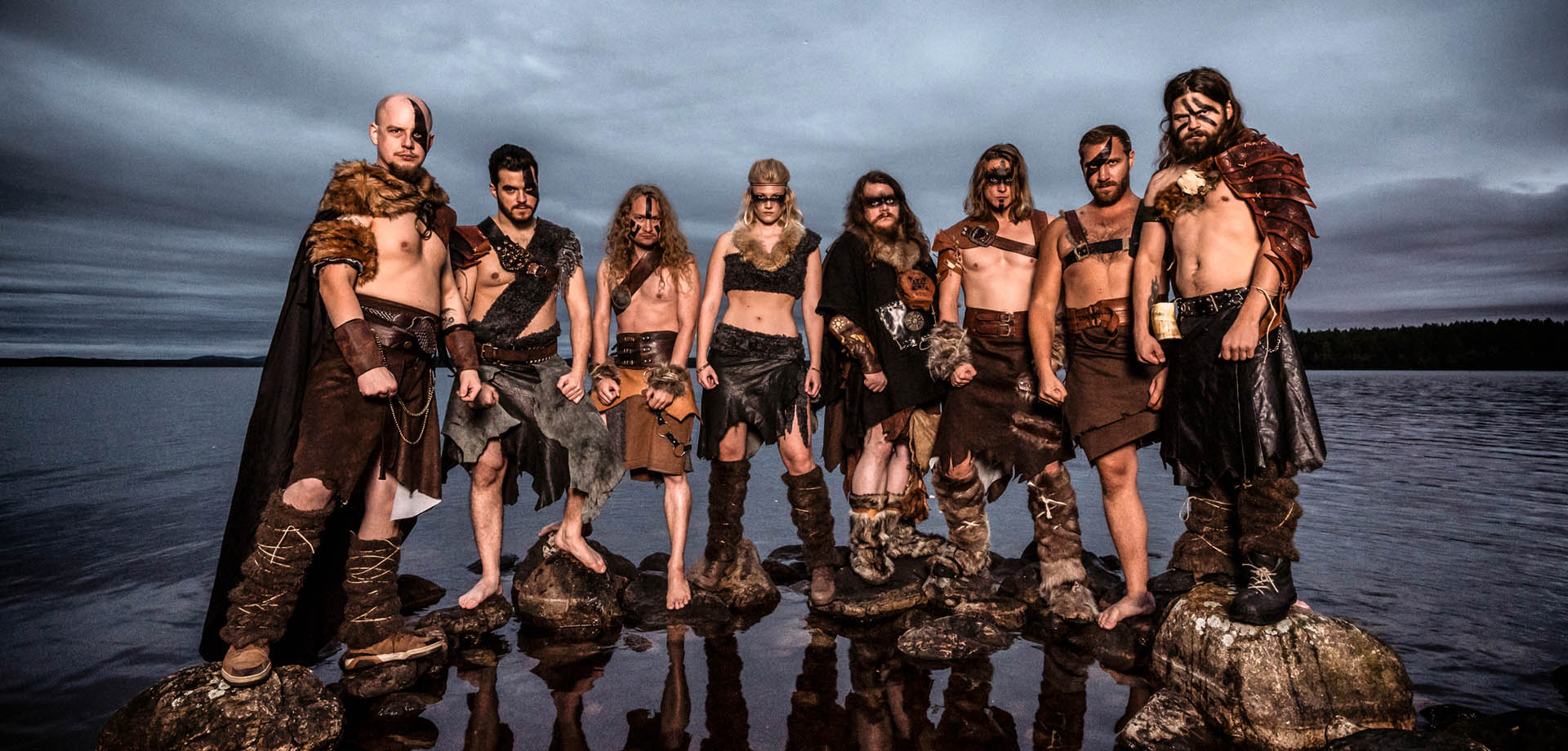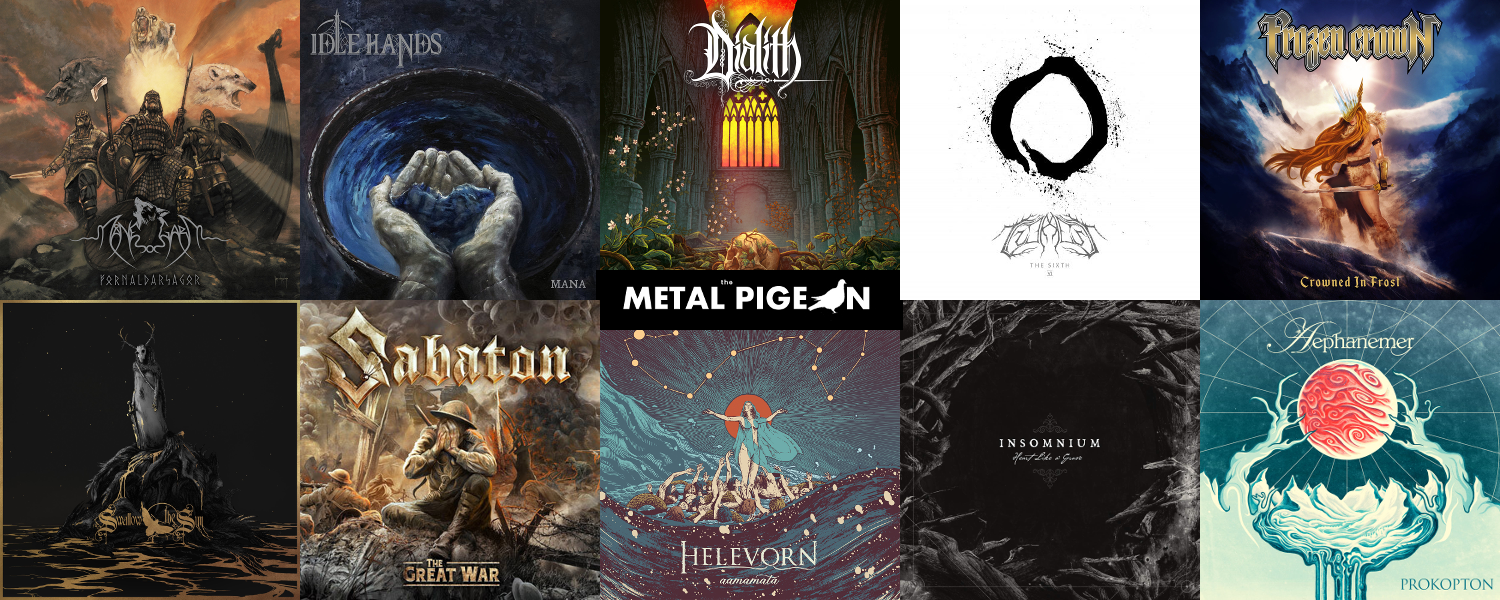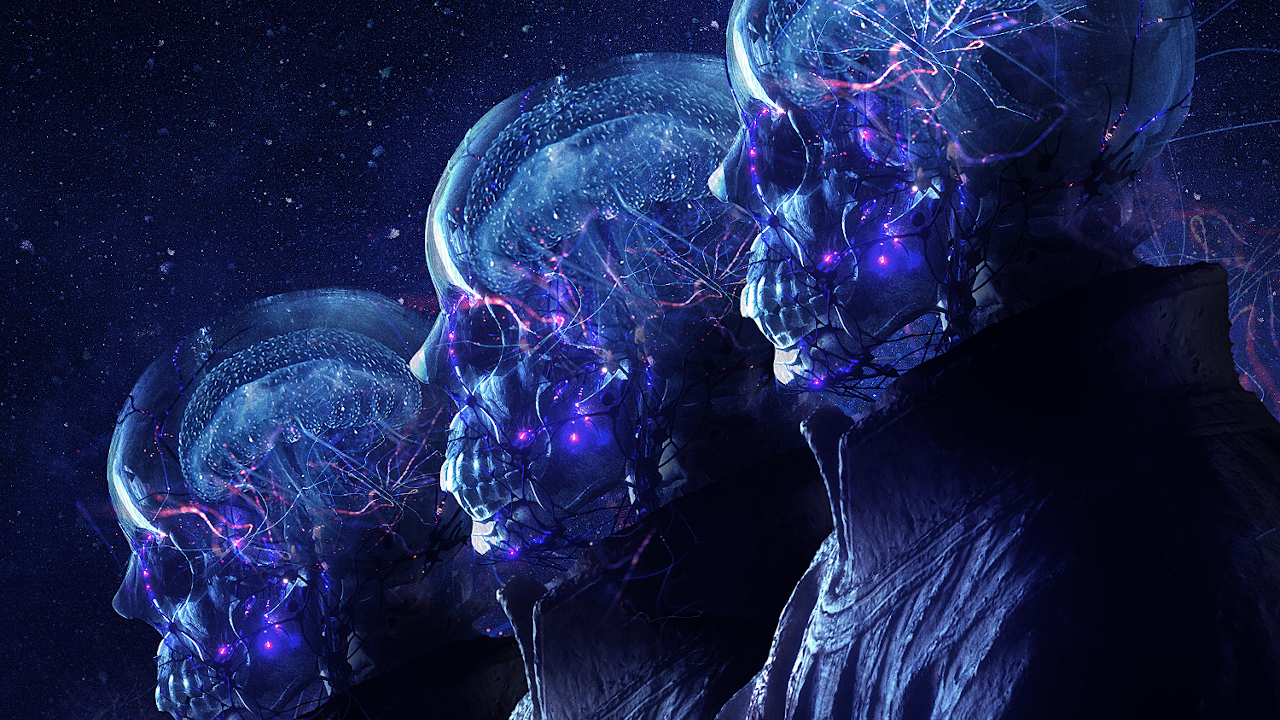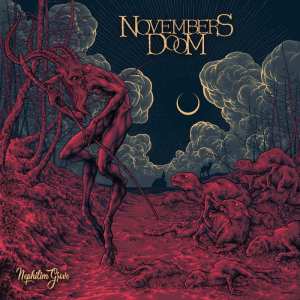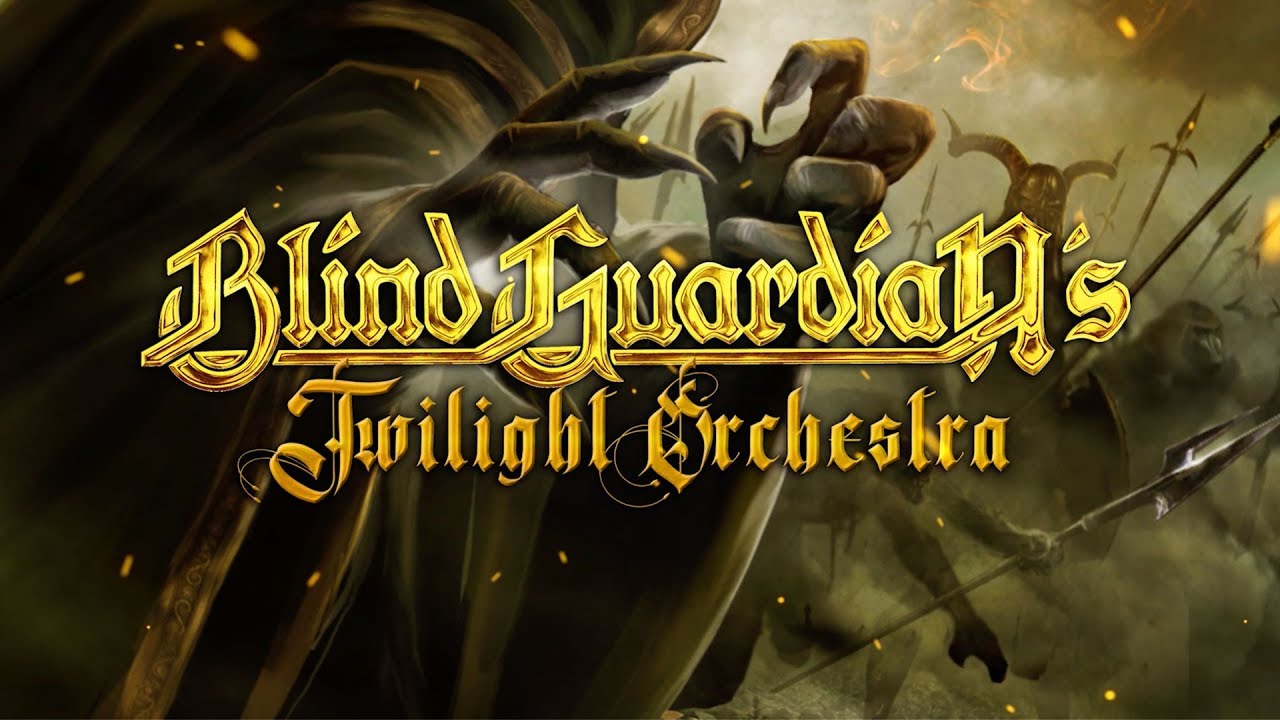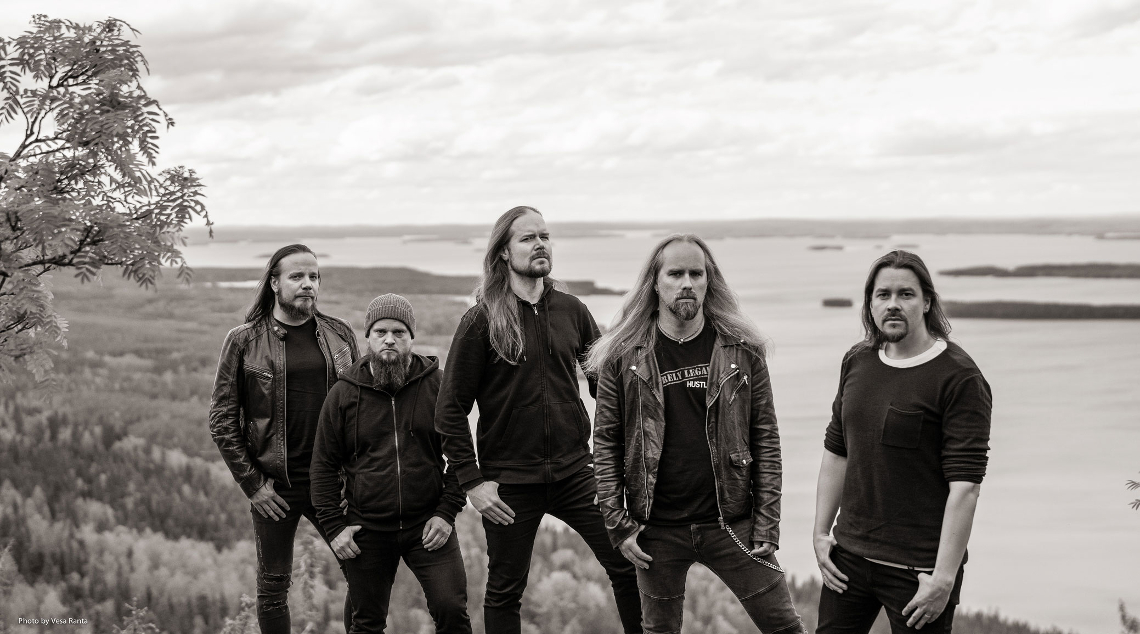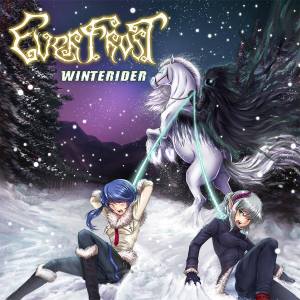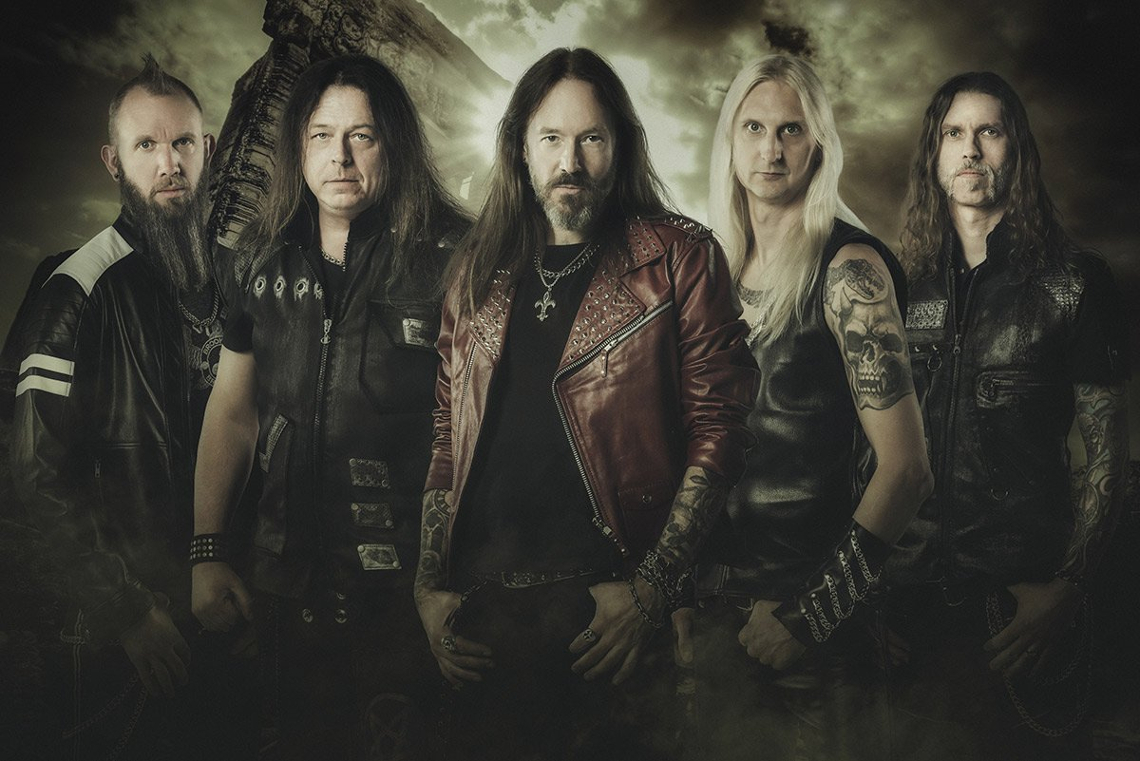The slow start to the year in January quickly evaporated with an onslaught in February, and we’ve gotten some big names in the mix too (well, relatively speaking of course). Chief among them is the fifteen years plus in the waiting third Demons & Wizards album, Hansi Kursch and Jon Schaffer’s side-project that has taken on an almost legendary air in the interim period. You heard it in the murmuring crowd on their recent North American tour, and I felt it myself —- a sort of disbelief that we were seeing these two major figures in power metal history standing onstage together. That’s a lot to live up to, not only with the show itself, but with an album that we’ve heard more than a few estimated release dates for during that time. We’re also getting new releases from Finland’s genre-bending Amberian Dawn, who are stretching the limits of power metal to its poppiest extreme yet, and of course the once power metal supergroup Serious Black that’s more of a honed in melodic metal vehicle for the mighty Urban breed. Lastly, there’s the sophomore album by Seven Spires, a band who is on two major support slots in North America this year for very relatively different audiences. Intrigued? I thought so!
Demons & Wizards – III:

I guess I’ve put this off long enough. This review was originally going to be one of the long ones, you know, my 1200 plus word excursions going in depth on an album’s backstory, details, and hidden nuances. Forget that. I simply can’t summon the interest. I’ll get right to the point here, and it gives me absolutely no pleasure to write the following —- but this album bored me and is a chore to listen to. An absolute chore. I’m gravely disappointed. Not only because of the pedigree of the two musicians involved; not only because of the precedent set by their prior two albums —- one of which was pretty good (and sounding better by the minute) while the other I’d consider a power metal classic —- but also because I was so hyped for this thing after witnessing the band live in Dallas last August on their North American tour. That was a great show, and to hear songs like “Tear Down The Wall” and “Fiddler On The Green” in person was a dream I’d never imagined being possible come true. As a result, I allowed myself the luxury of getting hyped for this album, and yeah, I suppose the near fifteen year wait also added a bit to that. There’s been a lot written and spoken about that span of time in between this album, the creatively titled III, and 2005’s Touched By The Crimson King (now that’s an album title!), and it should be made clear to everyone that it had no impact on adding anything of value to the songwriting that went into these new songs. Jon and Hansi’s day jobs kept Demons & Wizards on the sideline until they could eventually find an opportunity to carve out a block of time to devote to it. The reasoning is rational enough on the surface, but I’m starting to wonder if they wouldn’t have been better off just working on material slowly through the years, passing ideas back and forth until they finally accumulated an album’s worth of material. Would we really care if any of the songs had begun in 2006 as opposed to being recent creations, entirely “fresh” and new? I’m guessing no as long as they were good.
So what’s wrong with this album then? I’m afforded the luxury of being vague here, simply because this one criticism applies to nearly everything on here barring a moment or two, but this album sounds entirely disconnected. The debut album began as an in-person collaboration between Jon and Hansi, and the limits of technology at the time forced it to largely remain that way, despite the pair working on it via mailed recordings as well. The follow-up had to be done under a tighter time schedule, and Schaffer’s gone on record as stating it as a reason for his slight dissatisfaction with the overall result. But whereas the songs on the debut really felt like they were cooked up together, the result being a natural fusion of the two songwriter’s tendencies and styles, Crimson King felt divided due to being largely written separately by Jon and Hansi in geographic isolation. I used to think that was the album’s achilles heel, but as the years have gone on, I think it actually worked to its benefit. To me, half of that albums songs sound like Schaffer led tunes, and the other half Kursch’s —- meaning that some songs lean hard in an Iced Earth direction (“Terror Train”, “Crimson King”, “Seize The Day”, “Dorian”), whereas others are clearly more Blind Guardian tinged (“Beneath These Waves”, “Wicked Witch”, “Love’s Tragedy Asunder”, “Down Where I Am”, “Lunar Lament”). The result was a largely strong collection of songs, because each of the songwriter’s hard leans towards their strengths ensured that at least the melodies would be affecting. It would be inaccurate to say that Jon and Hansi each wrote half of Crimson King on their own, these were collaborations after all and Jon did pen music for all the tracks, and Hansi did write his own vocal melodies for all the songs. I’m more referring to the songwriting structures present in all those songs, as they provide strong context clues as to what came to dominate a song first in its early songwriting stages, the riff or the vocal melody?
Fast forward to III, where it’s clear that the riff came first, always and to a fault. As confirmed by the dozens of interviews Jon and Hansi have done for the album, they largely wrote this album geographically isolated from one another just like they did for Crimson King. This time however, I think they made a critical error in the division of responsibilities in the songwriting department. Simply put, they got too diplomatic for their own good. According to those interviews, Jon wrote the music, Dropboxed the tracks to Hansi, who would write vocal melodies for them. I’m certain there was some passing the songs back and forth after that point, but given that these hooks never really get that “lift” like we’re expecting and the verses just aimlessly merge into the refrains like a texting driver at a rush hour intersection, I’m not 100% certain of that either. When Jon writes for Iced Earth, he builds a song with vocal melodies in his mind as well, and will communicate a sketch of that idea to his vocalist (who may or may not have the leeway to change things). Of course Iced Earth songs are melodic, but they’re largely chiseled that way via shaping the tone and direction of riffs, not pure melodies in the sense that say… Tobias Sammet writes Avantasia’s songs on keyboards first. When Hansi writes for Blind Guardian, he and Andre work in tandem, sometimes with the vocal melody coming first, sometimes with a guitar melody coming first. Point is that their work is more melodically guided, and riffs and heaviness are worked in around that. Listening to III, I get the feeling that Jon didn’t want to tread on Hansi’s boots, and created riff driven songs with some melodic structures, but largely left space for Hansi to guide things with his vocal melodies. Subsequently, Hansi was given half-finished tracks that he had to figure out how to shoehorn lead vocal melodies therein, and likely didn’t pass any of them back to Jon and say “Yeah I have nothing for this one”. If you’re followed this train of thought this far, you might be of the opinion that I’m overthinking this —- you’re likely right, but I had to dig deep to potentially understand why, oh why I haven’t been able to get into this album after umpteen listens. I might even be wrong on all of the rationale above, but it’s all I can offer by way of explanation right now.
There were a few worthwhile moments, the entirety of “Wolves In Winter” being the best song on offer here and comparable to the band’s work on their prior two records. A near perfect merging of the heavy riff first approach with a classic Hansi vocal melody during the refrain results in a stellar track, at once unique with its primal, grunting, rhythmic tick and familiar in the sense that Hansi sounds powerful and confident as we’ve heard him countless times before. And I’m somewhat partial to most of “Diabolic”, which has elements that drag for sure (the long intro and outro for starters), but also displays one of the more convincing riff structures on the album in terms of pairing intensity with a melodic motif. I think there’s a good idea somewhere in “New Dawn”, where Hansi captures my attention every now and then, particularly his “I cleanse it with fire” lyrical motif towards the end (if only the rest of the song could match his intensity). I’m also in the minority in being somewhat into “Midas Disease”, not for its dumb, mawkish AC/DC tribute inherent in it’s plodding hard rock rhythms, but for Hansi’s spot on Blackie Lawless impersonation throughout, sounding for all the world like a distant echo from The Headless Children. As for the rest of these songs… I’m just baffled. I have thumped my head against them for countless listens now and am coming away with nothing but bruises and a growing loathing for the mere act of listening to this album. Out of respect for Jon and Hansi, I will shelve this for awhile and return to it in a year or two’s time to give it another shot. Reinforcing my theory that things may have been too diplomatic all around for this album, both Jim Morris and Charlie Bauerfiend were involved in the production at some stage, which just seems weird. The prescription for the next time around, should there be one, might be for Jon to largely write half the songs on the album and Hansi to nearly entirely pen the other half —- or, heck, here’s a thought, book a flight and get in a room and write the entire album together for once.
Seven Spires – Emerald Seas:

You might have seen the name Seven Spires listed on a few high profile tours this year and idly wondered who and what they were all about. Their biggest claim to fame heading into the release of their sophomore album Emerald Seas is that their vocalist/keyboardist Adrienne Cowan was the backing vocalist on Avantasia’s recent Moonglow world tour. Her role on that tour was certainly the reason why I first noticed the band and checked out their 2017 debut album Solveig when that tour was announced. I came away thinking it was an interesting record that flashed some nice ideas here and there, the kind of thing that a few albums down the road could see Seven Spires hone into a well defined sound and deliver a possibly great album (provided they could stay together for that time). The last thing I expected was that the band was talented enough to make that leap in fully realizing their sound and songwriting approach a mere one album later. So much for the sophomore slump, because Emerald Seas might just be the most exciting, creative, and thoughtfully written album we see this year. I’ve been stunned and knocked sideways by how much I love this album, and I’ve actively had to force myself to take days off from listening to it so I could squeeze in listening time for other releases. You might have noticed that Seven Spires is going to be opening for Insomnium this spring as well as Amaranthe in the fall, and they’re able to fit into both slots quite well because they blend together progressive symphonic power metal and a blackened vocal take on melo-death.
Cowan has the vocal talent to make these genre blendings sound seamless, transitioning between three voices —- a soaring, heartwarming crystalline tone that can move to a gritty, belting rock n’ roll voice, and of course go deeper in a grim vocal that reminds me strongly of Dani Filth’s midrange delivery. You hear this right away in “Ghost of A Dream”, where she displays all three approaches within the context of a handful of ultra-memorable vocal melody structures. This is also the song where you might be wondering what other band’s vibes you’re being reminded of, and the answer on the tip of your brain is Kamelot. There’s a depth to Seven Spires musicality illustrated here and throughout the album that brings to mind Kamelot’s Epica era. I’m thinking here specifically of the Spanish-sounding acoustic guitar figures that flare up alongside Cowan’s lithe vocals in the verses, as well as the elegant accordion style adornment in the background recall Roy Khan’s narrative vocal masterpiece in “Lost And Damned” off that album. Guitarist Jack Kosto also has a Thomas Youngblood-ian sense of how to keep his riffs muscular but largely simple when set against the backdrop of Cowan’s grandiose, cinematic orchestral keyboard backdrops. This artful approach to symphonic metal yields songs like “Every Crest”, where an almost Broadway styled vocal melody can swing suddenly into a brutal, utteringly convincing harsh vocal passage with a Hans Zimmer inspired slant to the orchestral arrangement. During the former, bassist Peter de Reyna shows off some nimble jazzy structures figures underneath Cowan’s vocals, and alongside drummer Chris Dovas’ thoughtful battery and Kosto’s knack for neoclassical styled shredding and spectacular soloing, this band unexpectedly injects frequent doses of stunning technicality throughout the album. It’s a subtle detail, but it works to add a sense of vitality and boiling emotional swell to the album in the same way that Dialith achieved with their infusion of gritty, intense melodic death riffs to their symphonic metal oeuvre.
This is the rare album with no weak songs, nothing resembling filler, but there are a couple of absolute gems that shine greater than the others, namely “Unmapped Darkness” and “Succumb”. The former is the grandest and boldest example of the band’s almost effortless swagger at pulling off the arms wide, cinematic expansiveness that its hopeful lyrics speak to. Cowan claims Roy Khan as one of her biggest influences, and her lyric writing abilities come pretty damn close to his in terms of diction, imagery, and phrasing. She’s really friggin good at this stuff. Take the chorus of “Succumb”, easily the catchiest moment on the album, where she eschews generic ideas in favor of “And so I succumb to cinnamon, sweat, and rum / Laughing with stars in your eyes and your hair undone / And I pray one day our stars align / So I might hold you one more time…”. That’s Khan level poetic abilities on display, and you guys know how I feel about the master himself (I’m not making this comparison lightly). Consider me a Cowan lyrical fanboy now, because this album has captivated me on that level completely, telling a story about a seafarer and the beast that’s chasing him. Its rare that a storyline intrigues me on any level within a metal album, but there’s something charming and rare about the one that Cowan has sketched out here —- it’s allowed for the variety of moods and emotions displayed amidst the differing songwriting styles and approaches. To wit, the gorgeous moonlit piano ballad “Silvery Moon” is a personal favorite here, the kind of thing I’d more associate with a stage play rather than a symphonic metal band, but Cowan’s lyrics are heartbreakingly poignant, and paint an evocative series of pictures in my mind. I could go in detail about the lyrical gems scattered throughout this record, in addition to its unforgettable melodies, but I promised myself I’d keep this short —- also, this isn’t the last I’ll be writing about Emerald Seas this year…
Amberian Dawn – Looking For You:

I became a fan of Finland’s once symphonic metallers Amberian Dawn in 2015 with the release of Innuendo, not so much because of the band’s still present symphonic metal palette, but for the strange, inexplicable ABBA influences scattered throughout the album. It was an interesting moment to be introduced to the band, who were finding their way with the still relatively new vocalist Capri Virkkunen who joined one album prior, after the departure of longtime classically inclined singer Heidi Parviainen. Capri possessed an entirely different voice, more a velvety, sonorous pop-rock voice as opposed to anything resembling classical training. It was Amberian’s Tarja to Annette moment, and band founder/keyboardist/songwriter Tuomas Seppälä saw an opening to move away from a symphonic metal direction that he’d run with for four albums now with varying results and modest public interest, towards a more overtly pop driven approach inspired by the Swedish quartet. Capri had previously spent some time singing in an ABBA cover band, in addition to trying out for Eurovision a couple times, so her pop credentials were rooted in that classical European dramatic mode that made those ABBA hits so emotionally engaging. It also helped that her vocals sounded like a perfect blending of Agnetha and Frida, from tone to the clarity of her diction and phrasing. She and Seppälä seemed to be of one mind in this, because they increased the amount of pop-driven songwriting on the 2017 follow-up Darkness of Eternity. It seemed inevitable that they’d at some point have to just abandon the band’s symphonic metal roots… clearly they were having more fun heading in the opposite direction.
Fast forward to Looking For You, Capri’s fourth proper album with the band, and they’d pretty much done exactly that. Oh there’s still a nod to their symphonic metal past, on “Symphony Nr. 1 Part 3 – Awakening”, an entertaining to say the least duet with Fabio Lione which is actually the third installment in this song-suite over the past couple Capri fronted albums. But that one cut aside, Seppälä goes all in on the ABBA-worship this time, with the rest of the album working in that sophisticated pop songwriting mode. Capri is the star throughout, her mature, resonant voice clearly made for the theatrical, drama-rich lyrical delivery this kind of classic pop influence requires. The apex here is the title track, a sugary dance-beat fuelled pop confection built around a finely defined vocal melody that weaves effortlessly from verse to bridge to chorus. Capri’s the ringleader here, her urgency in tone is the cue for the extra crunch from the guitars, and really the band as a whole. There’s a very true to seventies-ABBA era pop approach to the lyrics here, with vague, hopeful sentiments expressed through a staging of a very specific scene —- “Late at night / Wondering where you are tonight / I feel the sadness in my heart”. I hear shades of “Knowing Me, Knowing You” and “The Day Before You Came” influencing this particular lyrical approach that Seppälä and Capri are writing with. It continues on “Two Blades”, another ultra catchy uptempo gem, where the narrator speaks about her relationship that is all smiles to the world around them, yet crumbling on the inside: “They don’t know how it feels to be / Forgotten in the hours of the night / Hiding in the shadows and being lost / And left behind for a lifetime”. I love the juxtaposition at the 2:38 mark of that satisfyingly crunchy riff sliding beneath Capri crooning “I am, I am the sun…”. This is pop songwriting at its classicist best, with a lyrical approach that is inviting and universal in its portraits of desperation and urgency. Its the kind of thing I find lacking in a lot of modern pop music (with some notable exceptions).
So maybe you’re thinking at this point, c’mon Pigeon, ABBA-metal? Why does this have to be a thing? And my answer is a very simple, “Why not?”. Here’s the thing about Amberian Dawn laid out bluntly, they’re simply more interesting and unique since they’ve been exploring music in this vein than they ever were as a symphonic metal band. I’m not saying there’s nothing of value in those older albums, but it’s generally stuff that feels overdone to the point of exhaustion. And here’s another thing —- no one, and I mean no one, is writing pop music in this classic ABBA mold, not even in the pop music world. As an outright fan of that band, I welcome new music in that vein, particularly if its as delightfully faithful, convincing, and skillfully executed as Amberian Dawn are managing to do. There’s plenty of bands out there doing symphonic metal, some are even pulling it off rather well (see Dialith’s Extinction Six), but only Amberian Dawn is giving me the sugar high I crave with sophisti-pop hooks ala a re-worked/refreshed “Cherish My Memory”. It also serves to give the band a unique identity, something that they had trouble finding in their previous style. Capri has a unique voice within metal, a classic pop voice that she’s used to develop a stage career in addition to her vocation as a music teacher. In that vein she’s sympatico with Falconer’s Mathias Blad, another theatrical stage performer who moonlights as a singer in a metal band, using a non-metallic voice to create something really unique and special within metal. To really drive the point home, Amberian Dawn cheekily laid down a cover of the Swedish masters’ “Lay All Your Love On Me” in the middle of the tracklisting here, and not only is it a perfectly executed cover (immediately preferable to Avantasia’s), it’s a bold declaration of intent and a giant middle finger to anyone who’s thinking of throwing stones.
Serious Black – Suite 226:

So apparently I’m one of the few weirdos that actually thought Serious Black’s 2016 sophomore effort Mirrorworld was a fine slice of Euro-tinged power metal. I’ve read pretty much nothing but verbal abuse hurled towards it in the years since its release, from reviews I’ve gone back and read, to the fine folks on the r/PowerMetal subreddit having their daggers sharpened for it. I can see why those attacks would come at the expense of Mirrorworld’s follow-up, 2017’s Magic, although it too contained a few good tunes (I still stan “Binary Magic” and ” amidst the overall cringe on display), but I do have a theory as to why Serious Black has endured a brunt of negativity over the course of their entire existence. It largely has to do with their vocalist Urban breed, who is nearly universally beloved in the power metal community for his masterful work with Tad Morose and briefly, Bloodbound. On his defining work with those two bands, Urban sang over heavier, darker, far more metallic power metal than he does in Serious Black, which is a little closer to happy-boi Helloween and Freedom Call on the spectrum than it is to Khan-era Kamelot or say, Pyramaze. That’s not to say Serious Black is all sugary highs and syrupy sweet melodies, but there’s a slightly sunny-ish disposition streaking through their four albums in terms of melodic tone and sometimes even lyrical approach that I think a lot of Urban fans are put off by. It’s certainly not for any decline in the man’s vocal ability, because he still sounds as powerful and ageless as ever, but this band’s material does send his voice into sharply different directions than some are used to.
For those of us who are used to Urban in this context, we’re treated to a rebound record for Serious Black with Suite 226, a concept album about a mental patient locked in a psych ward (apparently). Largely gone are the weirdly pop-rock affectations of Magic, replaced instead by a welcome return of darkness and perhaps the most marked uptick in aggression in the band’s short history. Right out of the gate, “Let It Go” is the most Dave Mustaine-channeling that we’ve ever heard Urban, and with the blistering, furious riffing from Dominik Sebastian speeding along underneath, the whole thing sounds downright Megadeth-ian. That energy doesn’t dissipate heading into the first single “When The Stars Are Right”, which for all its loaded poppiness in that excellent chorus is still bookended by some dense riffing, and a tight rhythmic attack on the bottom end by bassist Mario Lochert and Ramy Ali on drums (who is a longtime veteran talent in the more obscure side of Euro power metal and a quality replacement for Alex Holzwarth). On a more mid-tempo cut like “Solitude Etude”, the band opts to employ a darker, more downcast mood along with Urban delivering a melancholic vocal melody. They do this again on the notably more poppy “Fate Of All Humanity”, and in lieu of straightforward aggression, the moodier, more introspective approach is still a welcome relief from what we can reasonably label as Serious Black’s default blue skies disposition. Urban delivers an unforgettable hook in the chorus here, and its still as poppy as power metal can get, but its a subdued sweetness, tempered by the lyrical concerns of the concept running through these lyrics.
And it’s strange, because I don’t think I picked up on this overall shift in mood and approach my first few listens through this album. I was here for Urban and the hooks, and we’re of course treated to those in spades, but it was deeper listening that revealed the aggression and darkness buried underneath. Take “Castiel”, arguably the album’s best cut and one of the finest songs the band has ever written, it’s built on major-minor chord dichotomy and a seriously swaggering chorus that owes more to classic heavy metal than Europower. I love the delay that Urban playfully tags onto the end of the second iteration of the chorus, making that slamming Accept-ian riff just hit you with full force when it breaks back in. There’s some heavyweight metallic grit happening in that tune but the addictiveness of the chorus really deafened me to it for the first few listens. The opposite happened on “Heaven Shall Burn”, an obviously heavy tune that is sneakily one of the strongest songs on the record, boasting a hook that’s slyly catchy despite its purposefully awkward approach. The most uplifting thing on the album is “Way Back Home” and amidst the downcast vibe it actually stands out just by its marked shift in tone alone. I’m more impressed by “We Still Stand Tall”, which is similarly more upbeat in tone and disposition, but is still underscored by a current of gritty heaviness anchoring it firmly to earth. The two songs that close out the album, “Come Home” and the title track swing us back to the darker side of the album, and they’re fine in that context, although I’m finding myself more liable to grow impatient with their slower, meandering sections and skip out of them. That minor complaint aside, I’m honestly surprised and maybe a little relieved that Serious Black found their footing again after such a worrying release. Give this one a few chances.

